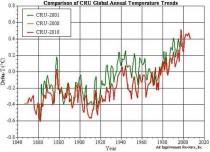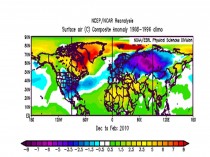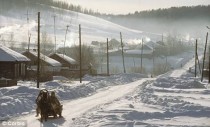By Margaret Wente
Maybe it was just a bad dream.
Just a year ago, 15,000 of the world’s leaders, diplomats, and UN officials were gearing up to descend on Copenhagen to forge a global treaty that would save the planet. The world’s media delivered massive coverage. Important newspapers printed urgent front-page calls for action, and a popular new U.S. President waded in to put his reputation on the line. The climate talks opened with a video showing a little girl’s nightmare encounter with drought, storms, eruptions, floods and other man-made climate disasters. “Please help the world,” she pleads.
After two weeks of chaos, the talks collapsed in a smouldering heap of wreckage. The only surprise was that this outcome should have come as a surprise to so many intelligent people. These people actually seemed to believe that experts and politicians have supernatural powers to predict the future and control the climate. They believed that experts know how fast temperatures will rise by when, and what the consequences will be, and that we know what to do about it. They believed that despite the recent abject failure of Kyoto (to say nothing of other well-intentioned international treaties), the nations of the world would willingly join hands and sacrifice their sovereignty in order to sign on to a vast scheme of unimaginable scope, untold cost and certain damage to their own interests.
Copenhagen was not a political breakdown. It was an intellectual breakdown so astonishing that future generations will marvel at our blind credulity. Copenhagen was a classic case of the emperor with no clothes.
Mercifully, nobody will pay attention to the climate conference at Cancun next week, where a much-reduced group of delegates will go through the motions. The delusional dream of global action to combat climate change is dead. Barack Obama’s cap-and-trade scheme is dead. Chicago’s carbon-trading market is dead. The European Union’s supposed reduction in carbon emissions has been exposed as a giant fraud. (The EU is actually responsible for 40 per cent more CO2 today than it was in 1990, if you count the goods and services it consumed as opposed to the ones that it produced.) Public interest in climate change has plunged, and the media have radically reduced their climate coverage.
The biggest loser is the environmental movement. For years, its activists neglected almost everything but climate change. They behaved as if they’d cornered the market on wisdom, truth and certainty, and they demonized anyone who dared to disagree. They got a fabulous free ride from politicians and the media, who parroted their claims like Sunday-school children reciting Scripture. No interest group in modern times has been so free from skepticism, scrutiny or simple accountability as the environmental establishment.
Perhaps some good will emerge from the wreckage. (Humility, for example.) Now that global warming has stopped sucking all the oxygen out of the room, some of those who care about the planet will turn to other - and more pressing - problems. There are plenty. Humans are encroaching everywhere on habitats and species. Don’t worry about the polar bears, which have survived hundreds of thousands of years of melting and freezing ice. Worry instead about the lions and tigers, which face extinction within our lifetime. Their problem isn’t climate change. It’s us.
A century ago, there were more than 100,000 wild tigers in Asia. Today there are just 3,200. Civilization is squeezing them, and poachers hunt them for their skin and body parts. This week, the unlikely team of Vladimir Putin and Leonardo DiCaprio headlined a 13-country tiger summit in St. Petersburg that is tackling the challenge of making live tigers worth as much as dead ones.
Then there are the lions. They’re not as scarce as tigers - yet - but their habitats are ideal for ranching, and they face increasing pressure from population growth. Or how about the bluefin tuna? This one is close to home - we catch them and sell them to Japan - and Canada is on the wrong side of the issue. If the World Wildlife Fund could whip up as much alarm over the bluefin tuna as it tried to whip up over fictitious drowning polar bears, I might even be persuaded to send them money again.
Before they were sucked into the giant vortex of global warming, environmentalists did useful things. They protested against massive Third World dams that would ruin both natural and human habitats. They warned about invasive species and diseases that could tear through our forests and wreck our water systems. They fought for national parks and greenbelts and protected areas. They talked about the big things too - such as how the world could feed another three billion people without destroying all the rain forests and running out of water. They believed in conservation – conserving this beautiful planet of ours from the worst of human despoliation - rather than false claims to scientific certainty about the future, unenforceable treaties and radical utopian social reform.
“How high a price must the world pay for green folly?” asked the thinker Walter Russell Mead. “How many years will be lost, how much credibility forfeited, how much money wasted before we have an environmental movement that has the intellectual rigour, political wisdom and mature, sober judgment needed to address the great issues we face?”
The answer is too high, too many and too much. Please grow up, people. You have important work to do.
See post here.
ICECAP NOTE: We agree with Margaret and have been discussing how we can develop a more traditional environmental effort to address the real needs of the people and the planet not the faux global warming - population control driven advocacy that in the end creates much greater harm than good.
By Alex Morales, Bloomberg
World temperatures in 2010 may be the warmest on record, the U.K. Met Office said, as it plans to calibrate a decade of data to account for newer sensors.
The average temperature for the year through October shows 2010 will be one of the two warmest years in a series that goes back to 1850, said Vicky Pope, head of climate science at the Met Office. Scientists at the agency are preparing to revise data since 2000 to adjust for a new method that masked some of the rising temperature trend, she said.
Nine climate indicators, from temperatures in the lower atmosphere and humidity to rising sea levels, declining sea ice and shrinking glaciers all point toward a warming climate, according to a report today from the agency, which compiles one of the three main time series of global temperatures.
“There’s a very clear warming trend but it’s not as rapid as it was before,” Pope told reporters yesterday in London. Where the average temperature rose at about 0.16 degrees per decade since the 1970s, the rate through the 2000s has been from 0.05 to 0.13 degrees, she said.
The decadal rate for the 2000s may be 0.03 degrees higher once adjustments have been made to compensate for an increase in the use of buoys to take sea temperature measurements, Pope said. The buoys measure sea temperatures as being slightly lower than ships, which were used more in the past, according to Matthew Palmer, an ocean scientist at the Met Office.
U.S. Data
“We’ve effectively underestimated the rate of warming over the past decade,” Palmer said. A new series will be published at an as yet unspecified date, according to the Met Office.
The global average temperature for the year through the end of October was 0.52 degrees Celsius (0.94 degrees Fahrenheit) warmer than the 1961 through 1990 average of 14 degrees, the same as 1998, the hottest year in the Met Office series.
“It’s currently the second-warmest year on record,” Pope said, noting that 1998 had a “strong” El Nino phenomenon, a cyclical warming of the Pacific Ocean that typically raises the global average temperature. This year began with an El Nino and has switched to the reverse phase, called La Nina, she said.
While the Met Office didn’t provide a figure, the 0.03- degree revision in the decadal rate would add a tenth of that, 0.003 degrees, to this year’s data relative to 1998, which predates the period being revised.
The Met Office compiles the data along with the University of East Anglia in eastern England, which last year had thousands of e-mails stolen from its servers and posted on the Internet, causing skeptics to charge that the data were manipulated. Three investigations have since cleared the school.
The World Meteorological Organization is due to announce a first estimate of 2010 temperatures on Dec. 2 during two weeks of United Nations climate changes talks in Cancun, Mexico.
The U.S. National Oceanic and Atmospheric Administration and the National Aeronautics and Space Administration publish two other widely used global average temperature series. They have 2005 as the warmest year due to differences in the way they account for temperatures in parts of the world where there are no monitoring stations. See story here.
Icecap Note: Among the emails was evidence that 2 versions of the CRU data sets actually had no statistically significant long term warming. They were rejected. As always, the alarmists regard the theory and models as the truth and if the data does not agree, there must e something wrong with it. This explains why Mann and the UK scientists on the team (e.g. Keith Briffa) got rid of the inconvenient natural Medieval Warm Period and Little Ice Ages and Wigley and others find ways to reduce the equally inconvenient 1940s warm blip.

In the graph above see the 2001 version vs the 2010 version with the suppressed warm blip (enlarged here).
In the remarks section of the CRU Code Climategate emails “James says that in the file pl_decline.pro the code seems to be reducing temperatures in the 1930s and then adding a parabola to the 1990s.” CRU (like NOAA and NASA) was careless at the very least or more likely manipulative with the data - constantly readjusting, always finding more warming to support the governments’ and IPCC’s agendas. This is why programmer Ian “Harry” Harris said in his CRU log “[The] hopeless state of their (CRU) data base. No uniform data integrity, it’s just a catalogue of issues that continues to grow as they’re found...There are hundreds if not thousands of pairs of dummy stations...and duplicates… Aarrggghhh! There truly is no end in sight...This whole project is SUCH A MESS. No wonder I needed therapy!!” And why Phil Jones told the BBC that his “...surface temperature data are in such disarray they probably cannot be verified or replicated”. Even Kevin Trenberth, IPCC Lead Author and CRU associate said, “It’s very clear we do not have a climate observing system...This may be a shock to many people who assume that we do know adequately what’s going on with the climate, but we don’t.” Steven Goddard comments on this here and credit him with this appropriate graphic. He follows up with this post with H/T to Marc Morano that shows great confusion in successive day press releases in preparation for Cancun.

By Maria Antonova, AFP
Russia may have endured its hottest summer on record and battled deadly forest fires, but attitudes on climate change remain dominated by scepticism and even mired in conspiracy theories.
Experts see no major substantial movement in Russia’s stance ahead of the latest UN climate conference in Cancun, despite the occasional acknowledgement by President Dmitry Medvedev that the earth is warming.
During the last major climate conference in Copenhagen, Medvedev published Russia’s ambitious Climate Doctrine and even appointed a climate adviser a month later.
Russia’s own weather agency Rosgidromet said in a weighty 2008 report that daily average temperatures in Russia would rise by four to six degrees Celsius by 2050, and that the change of the past 50 years was most likely man-made.
It concluded that “the dependency of Russia’s nature and economy on climatic factors… demand a serious scientific base to government policy on climate change.”
But two years later, after summer forest fires that ravaged more than a million hectares (2.5 million acres) in Russia and a heatwave believed to have killed thousands, state media are still debating whether climate change is a myth.
In August, Prime Minister Vladimir Putin even wondered aloud if the natural dying out of mammoths around 10,000 BC means that current climate change was also a phenomenon independent of human influence.
“Most scientists in the world now share the view that climate change is human-caused, but in Russia science is very politicized,” said Vladimir Chuprov, a climate expert for Greenpeace Russia.
Although Medvedev has indicated his concern at climate change, scepticism in academic circles remains due to Putin’s position, since Russian science depends on government funding, Chuprov told AFP.
“The position is: the world can change but we’ll survive on our oil wells and potatoes for however long. Oil is always needed, and we have enough of it in our lifetime,” he added.
In 2003, Putin amazed scientists when he speculated that a global warming by “two or three degrees” could be a good thing for Russia as its people would no longer need fur coats.
A press conference hosted by the RIA Novosti state news agency ahead of Cancun provided some indication of official attitudes. Called “Climate Change: myth or reality?” it gave a platform to a leading climate sceptic academic.
“Climate is a concept that has existed as long as the Earth exists… several hundred million years ago the temperature was 10-13 degrees higher than now,” said Yury Israel, director of the Institute of Global Climate and Environment at the Russian Academy of Sciences.
“What is happening now is not some kind of unusual special case,” he said, adding that life flourished on Earth at the time of dinosaurs.
Russia’s state television—often a reliable weather vane of government policy direction—has produced well-funded features on the subject of climate.
“The anti-cyclone came to Russia and stopped. Why?” a low voice narrated in a film shown on state Channel One in October. “Professionals don’t know, beyond science people offering shocking theories.”
A confused array of doomsday images followed: the planet Earth burst into flames, and chunks of Greenland broke off, flooding major cities on the Atlantic. “Who Caused the Warming?” the film asked point-blank.
Earlier this year, the Russian television answered that question in a 40-minute feature aired on TV5, a popular federal network based in Saint Petersburg.
“The smoke was very strange. Sometimes it thickened, only to disappear the next day,” said the film, called “Russia On Fire: Climate as a Weapon”. It went on to allege that the heatwave and fires were caused by the US Air Force’s HAARP (High Frequency Active Auroral Research Program).
But though climate scepticism and conspiracy theories abound in Russia, the heatwave and wildfires could bring about a gradual shift in attitudes, experts said.
A year ago, just ahead of the conference in Copenhagen, Channel One aired a feature claiming climate change was a concept dreamed up as part of a political conspiracy.
Now the heatwave has swayed public opinion from total denial, said WWF climate expert Alexei Kokorin.
“Some acknowledgement has occurred, but very slowly,” he said. “There is a realization that global warming is after all a bad thing.” See story here.
Icecap Note: Yeah sure. Siberia, where the winter time tempatures drop below 60F below zero, they are worrying about a projected 2F warming. A warming that is mostly at night and in winter. No acknowledgement in the story that last winter was one of the snowiest and coldest on record.

Enlarged here.

Western Russia farmers were hurt by the drought last year. But it has been acknowledged to be a natural in oriigin and not unprecedented. In recent years, Russia has benefited from the natural cyclical slight warming and increased CO2 which has benefited crop growth and minimized water needs.


